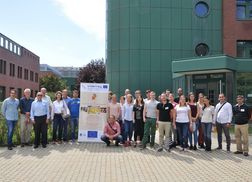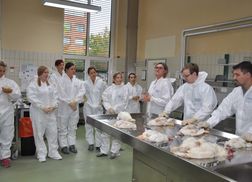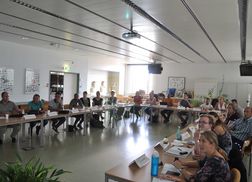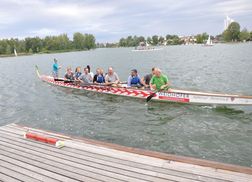2. CEPI Summer School on Poultry Health & Nutrition in Vienna
We could welcome 20 participants from 12 countries. Interested academics travelled to Austria not only from our partner country, Hungary, but we also had the honour to host scientists from other European countries as well as from Africa and Asia.
Well-known and experienced representatives of veterinary medicine and agricultural sciences as well as lecturers of both involved institutions gave presentations about the current developments in their fields of expertise. Peter Mitsch (Austria) and László Kőrösi (Hungary), veterinarians specialized on poultry, gave interactive and practice-oriented lectures about challenges in the veterinary practice in the field, and discussed possible solutions and preventive measures with the participants.
Michael Hess, Dieter Liebhart and Wageha Awad from the Clinic for Poultry of the Vetmeduni Vienna gave presentations on infectious diseases of the gut; the histomorphological changes in the alimentary tract; and the consequences of pathogens and mycotoxins on gut health.
Various aspects of poultry nutrition were discussed during the lectures of Károly Dublecz, László Pál, and Andor Molnár, all from the Department of Animal Science at the Georgikon Faculty, on the potential improvement of the efficiency of protein nutrition; the effect of early nutrition strategies; and the interrelation of nutrition strategies and gut health. Habib Rehman, who acted as participant and lecturer, addressed the options to minimize heat stress with prebiotics.
Lectures on poultry nutrition were completed by Martin Gierus from the Institute of Animal Nutrition at the University of Natural Resources and Life Sciences, Vienna, who focused on feed structure and consequences for the birds.
Furthermore, participants, instructed by Ivana Bilic und Merima Alispahic, were offered the chance to practice methods like PCR and MALDI TOF MS directly in the lab. Instructed by Claudia Hess, they also performed post-mortem investigation , and were introduced to requirements by quality management of a diagnostic laboratory by Astrid Hrdina.
The program also included an excursion to Tulln an der Donau, were the first item on the agenda was a visit of the BIOMIN Animal Nutrition GmbH research site. Gerd Schatzmayr, Research Director of the company, introduced the company in a presentation and drew a line from the fist beginnings until today. Afterwards, different research groups at BIOMIN presented their areas of research directly in the lab. Following a quick lunch at a Heurigen restaurant, the second stop on this last day of the program was at the headquarters of the Austrian Poultry Health Service (Österreichische Qualitätsgeflügelvereinigung, QGV), where the managing director Harald Schliessnig introduced the institution and the existing programs to improve health and food security.
Social events included a well-planned social program to stimulate personal exchange between participants and lecturers. Without doubt, the rowing tour on the old Danube was a certain highlight of the program, and demonstrated the strength of cooperation. During the evaluation, the participants gave valuable input and feedback on the programme and organization. Overall, the newly established contacts will enable future knowledge transfer and exchange concerning poultry health and nutrition.






